The Truth Behind Meat Glue: What You’re Really Eating and Why It Matters
posted on
July 13, 2024
Introduction In our quest for transparency and integrity in the food industry, one topic that often surfaces is the use of transglutaminase, commonly known as meat glue. This enzyme, while approved for use, has sparked a significant debate over food safety, ethics, and consumer transparency. At Pure Pasture Farms, we believe it's crucial to understand what goes into our food—especially when it contrasts sharply with our commitment to natural, unadulterated products.

What is Meat Glue? Meat glue is a protein-binding enzyme used to fuse small pieces of meat into seemingly whole cuts. Commonly found in products like chicken, crab, beef, lamb, and some processed meats, its primary appeal lies in its ability to enhance the appearance and texture of food products. While the FDA and USDA regulate its use, ensuring that foods containing this enzyme are safe to consume when cooked properly, controversies linger about its implications for food quality and consumer awareness (MeatChefTools) (NutritionFacts.org).
What is Meat Glue Made Of? Meat glue, or transglutaminase, can be derived from several sources. It is primarily a protein-binding enzyme that can be sourced either biologically from animal blood plasma—specifically, from the coagulant which causes blood to clot—or it can be produced through the fermentation of bacteria. There are also plant-based versions of transglutaminase. Each type of meat glue has the same functional purpose: to bind protein molecules together, creating a bond strong enough to make separate pieces of meat stick together seamlessly (MeatChefTools).
Health Implications Despite regulatory assurances, health concerns associated with meat glue persist. The main issue arises from its potential to harbor bacteria between glued pieces, which may not be eliminated unless the meat is cooked thoroughly. This poses a significant risk, especially when such meats are prepared rare or medium-rare. Furthermore, transglutaminase is often used in highly processed foods, which are typically high in sodium and other additives, raising additional health concerns for consumers (Utopia) (Lavender + Lab Coats).
Ethical and Transparency Issues Ethically, the use of meat glue raises significant concerns. Many consumers are unaware that they are buying products made from glued-together scraps, believing instead that they are purchasing whole cuts of high-quality meat. This misrepresentation goes against the principles of transparency and honesty in food labeling and marketing. At Pure Pasture Farms, we ensure that our meats are exactly what they appear to be: whole, unprocessed, and free from any additives like meat glue (Utopia) (Food Safety News).
Our Commitment at Pure Pasture Farms At Pure Pasture Farms, we stand against the use of meat glue and other artificial enhancers in food production. We raise our animals naturally, providing meats that are not only healthier but also ethically produced. Our commitment extends beyond just avoiding additives; it's about fostering a sustainable and transparent relationship with our consumers, ensuring they receive the best quality products that align with their values and health needs.
Why Choose Naturally Raised Meats? Choosing naturally raised meats from farms like ours means supporting practices that are better for the environment, the animals, and your health. You avoid the risks associated with meat glue and other processing aids, enjoy better flavor and texture, and support farming methods that respect animal welfare and ecological balance.
Conclusion As consumers, it's vital to stay informed about what goes into our food and make choices that align with our health and ethical standards. At Pure Pasture Farms, we're committed to upholding these values and encouraging a food industry that prioritizes consumer health and transparency. Join us in making a difference—one meal at a time.





